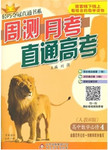题目内容
Little Jim to my home after he broke my mobile phone by accident.
A. dared not to come B. dared not coming
C. dared not come D. didn’t dare coming
练习册系列答案
 轻巧夺冠周测月考直通高考系列答案
轻巧夺冠周测月考直通高考系列答案
相关题目
题目内容
Little Jim to my home after he broke my mobile phone by accident.
A. dared not to come B. dared not coming
C. dared not come D. didn’t dare coming
 轻巧夺冠周测月考直通高考系列答案
轻巧夺冠周测月考直通高考系列答案